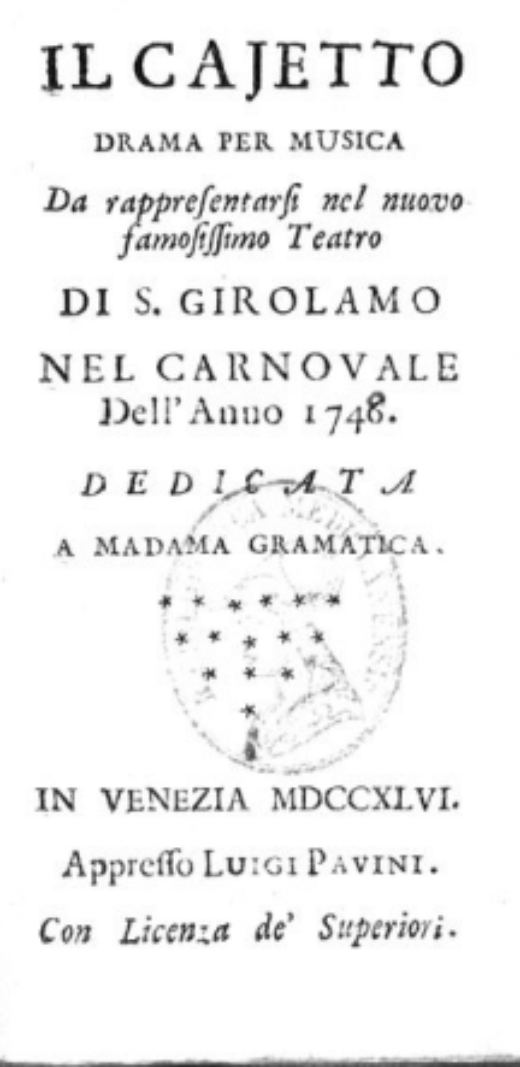
Printed
80 pages
Author(s)
Il Cajetto
To add to his family’s prestige, Angelo Maria Labia had a small stately theatre, the Teatro di San Girolamo, built in his palace on the Cannaregio canal in Venice; this was a miniature version of the Teatro San Giovanni Grisostomo. The theatre showed precious fabrics and materials, and the stages and scenery were moved by very intricate gears and machinery. The musicians, set designers and costume designers were among the most prestigious of the city. Il Cajetto was performed during the Carnival of 1746. Labia employed the same staff which had worked on Lo Starnuto d’Ercole and Eurimedonte e Timocleone. Antonio Gori’s libretto was staged with music by Ferdinando Bertoni and performed with costumes by Natale Canziani, a famous costume designer for regular theatres. Tommaso Cassani created the spectacular scenery. The singers performed behind the stage.
The libretti of the operas staged in Labia’s theatre were printed in in-24 for his guests. Like Zanetti’s, Gori’s libretto includes the cast and the puppets playing the characters, as though they were human actors, using imaginary names playing with their artificial nature (i.e.: “Antonio Bamboccio” or “Maddalena Statuina”).
In the epistle dedicatory addressed “To Madama Gramatica”, the author explains that he wanted to write a play in which the actors are children, “to copy the small size of the virtuosi they represent”; he is referring to puppets manipulated from above with strings and from below with springs. The children will often mention them (II, 6; III, 5). The performance features two ex machina entrances: at the end of the first act, Diana appears in her palace to stop the children’s quarrelling; at the end of the play, Apollo also appears to reconcile the children and announce that Erippo is forgiven. A scene of cross-dressing leads to a series of ambivalent and comical comments about homosexuality. The comic of the play rests on the coward Grino.
Young children try to negotiate with the invader
As the city-state of Faleria is being besieged by the Roman Camillo, Erippo, a teacher, decides to betray his city and hand the children of the Falerian nobility to Camillo as hostages. To avoid being thought of as a traitor, he manages to make the children betray the city themselves by pretending that his daughter Cloridea has been abducted by Camillo and his son Quinzio. Cajetto, Cloridea’s brother and the children’s chosen King, is set on sending ambassadors to Camillo to save his sister. He explains his plan to his other sister, Tulliola, who worries about her lover Fabiello, the pupils’ Great Councillor. She manages to convince the latter to remain hidden; thus, Crispino and Grino are appointed ambassadors. Crispino refuses to betray Faleria and negotiate with the enemy; Cajetto challenges him to a duel. Agripina also fears for Fabiello, whom she is secretly in love with. Diana keeps Cajetto and Crispino from fighting and announces that everything is unfolding according to the gods’ design.
Agripina asks Cajetto not to send her brother Crispino: as he agrees to her request, he declares his love to her and decides to send Fabiello instead, to the young girl’s utter despair. Tulliola rejoices at her brother and lover having been spared, but Agripina lets her know that Fabiello was appointed ambassador. Floruccio came to declare his love to Tulliola; to create a diversion, the latter asks him to fulfil the mission. Fabiello overhears the conversation and believes that Tulliola has betrayed him. He stops hiding and decides to fulfil her request: he will be the one to go. To warn her lover and offer herself as a hostage, Tulliola dresses in man’s clothes and goes to meet Camillo. When Grino, whom Fabiello sent scouting, tells her that he met a giant, Tulliola tries to divert his attention from the mission by pretending that she has been sent by Camillo, who wants to meet the Master rather than the pupils.
While Erippo is being interviewed by Camillo, Floruccio spreads a rumour: Fabiello has betrayed the city to get rid of his rival. Crispino announces that Camillo is generous and has both refused to take children as hostages and reported their master as a traitor to the Falerian Senate. Fabiello and Tulliola are speaking; she convinces him of her love: the jealous Floruccio walks in on them as they are exchanging vows. Fabiello is wanted, and Cajetto throws him in jail. As Tulliola is trying to free him, the lovers are caught. Floruccio announces that the Falerian Senate is opening the gates of the city to Camillo—to thank him for his magnanimity. The children fear for Erippo, and Cajetto wants to avenge his father by punishing Tulliola and her lover. The stage transforms: Apollo appears and announces that Erippo will be forgiven. He orders the children to resume their studies. The play ends with three weddings.
First performance
Teatro di San Girolamo
Publications and translations
Il Cadetto. Venezia: Luigi Pavini, 1746.